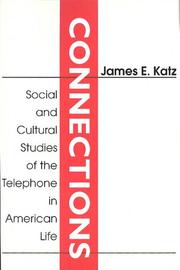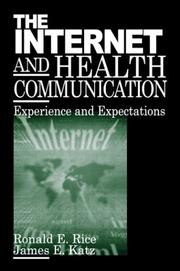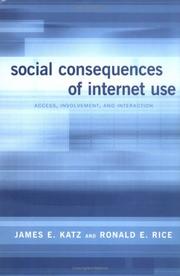| Listing 1 - 4 of 4 |
Sort by
|

ISBN: 1351289985 1351289993 9781351289986 9780765809957 9781560003946 1560003944 Year: 2017 Publisher: London, [England] ; New York, New York : Routledge,
Abstract | Keywords | Export | Availability | Bookmark
 Loading...
Loading...Choose an application
- Reference Manager
- EndNote
- RefWorks (Direct export to RefWorks)
Telephone --- Social aspects --- United States --- History.

ISBN: 0761922334 1322416125 0761922326 1452233276 1452264422 9781452264424 9781452233277 9780761922322 9780761922339 Year: 2001 Publisher: Thousand Oaks, Calif : Sage Publications,
Abstract | Keywords | Export | Availability | Bookmark
 Loading...
Loading...Choose an application
- Reference Manager
- EndNote
- RefWorks (Direct export to RefWorks)
This book provides an in-depth analysis of the changes in human communication and health care resulting from the Internet revolution.
Sociology of health --- Computer architecture. Operating systems --- Mass communications --- Health --- -Internet. --- Medical telematics --- Communication in medicine --- #SBIB:309H261 --- #SBIB:309H103 --- #SBIB:309H1713 --- #SBIB:034.AANKOOP --- Health communication --- Medical communication --- Medicine --- Clinical telematics --- Health telematics --- Telehealth --- Medical informatics --- Telecommunication in medicine --- Telematics --- DARPA Internet --- Internet (Computer network) --- Wide area networks (Computer networks) --- World Wide Web --- Personal health --- Wellness --- Physiology --- Diseases --- Holistic medicine --- Hygiene --- Well-being --- Computer network resources --- Voorlichting: toepassingsgebieden --- Mediatechnologie / ICT / digitale media: sociale en culturele aspecten --- Mediatechnologie: nieuwe toepassingen (abonnee-televisie, electronic mail, desk top publishing, virtuele realiteit...) --- -Internet --- Internet. --- Medical telematics. --- Communication in medicine. --- Computer network resources.

ISBN: 0521002664 0521807719 0511176163 051104190X 0511156898 0511329431 0511489471 1280430451 0511044526 9780521002660 9780521807715 9780511489471 110712462X 9780511329432 9780511041907 9780511044526 9780511156892 9781280430459 9786610430451 6610430454 9780511176166 Year: 2002 Publisher: Cambridge, UK ; New York : Cambridge University Press,
Abstract | Keywords | Export | Availability | Bookmark
 Loading...
Loading...Choose an application
- Reference Manager
- EndNote
- RefWorks (Direct export to RefWorks)
The spread of mobile communication, most obtrusively as cell phones but increasingly in other wireless devices, is affecting people's lives and relationships to a previously unthought-of extent. Mobile phones, which are fast becoming ubiquitous, affect either directly or indirectly every aspect of our personal and professional lives. They have transformed social practices and changed the way we do business, yet surprisingly little serious academic work has been done on them. This 2002 book, with contributions from the foremost researchers in the field, studies the impact of the mobile phone on contemporary society from a social scientific perspective. Providing a comprehensive overview of mobile phones and social interaction, it comprises an introduction covering the key issues, a series of unique national studies and a final section examining specific issues.
Cell phones --- Wireless communication systems --- Social aspects. --- Cellular telephones. --- Wireless communication systems - Social aspects. --- Communication systems, Wireless --- Wireless data communication systems --- Wireless information networks --- Wireless telecommunication systems --- Telecommunication systems --- Social aspects --- Social Sciences --- Sociology --- #SBIB:309H103 --- #SBIB:309H1711 --- Mediatechnologie / ICT / digitale media: sociale en culturele aspecten --- Nieuwe media, informatietechnologie (videotex, beeldplaat, interactieve televisie, vergadertelevisie,...) --- Cell phones - Social aspects --- Wireless communication systems - Social aspects

ISBN: 9780262256506 0262256509 0585434980 9780585434988 9780262112697 0262112698 1282096516 9781282096516 9786612096518 6612096519 Year: 2002 Publisher: Cambridge, Mass. : MIT Press,
Abstract | Keywords | Export | Availability | Bookmark
 Loading...
Loading...Choose an application
- Reference Manager
- EndNote
- RefWorks (Direct export to RefWorks)
Drawing on nationally representative telephone surveys conducted from 1995 to 2000, James Katz and Ronald Rice offer a rich and nuanced picture of Internet use in America. Using quantitative data, as well as case studies of Web sites, they explore the impact of the Internet on society from three perspectives: access to Internet technology (the digital divide), involvement with groups and communities through the Internet (social capital), and use of the Internet for social interaction and expression (identity). To provide a more comprehensive account of Internet use, the authors draw comparisons across media and include Internet nonusers and former users in their research. The authors call their research the Syntopia Project to convey the Internet's role as one among a host of communication technologies as well as the synergy between people's online activities and their real-world lives. Their major finding is that Americans use the Internet as an extension and enhancement of their daily routines. Contrary to media sensationalism, the Internet is neither a utopia, liberating people to form a global egalitarian community, nor a dystopia-producing armies of disembodied, lonely individuals. Like any form of communication, it is as helpful or harmful as those who use it.
Internet --- Digital divide --- Telecommunication --- Electric communication --- Mass communication --- Telecom --- Telecommunication industry --- Telecommunications --- Communication --- Information theory --- Telecommuting --- DARPA Internet --- Internet (Computer network) --- Wide area networks (Computer networks) --- World Wide Web --- Social aspects --- INFORMATION SCIENCE/Technology & Policy
| Listing 1 - 4 of 4 |
Sort by
|

 Search
Search Feedback
Feedback About UniCat
About UniCat  Help
Help News
News